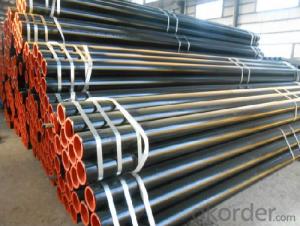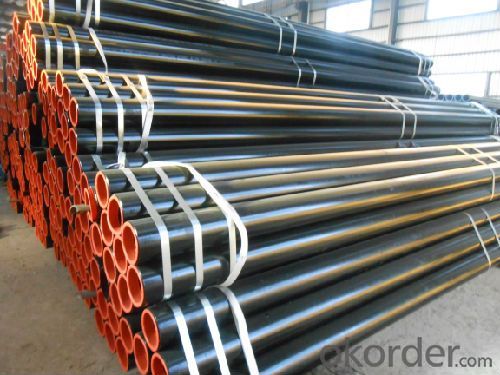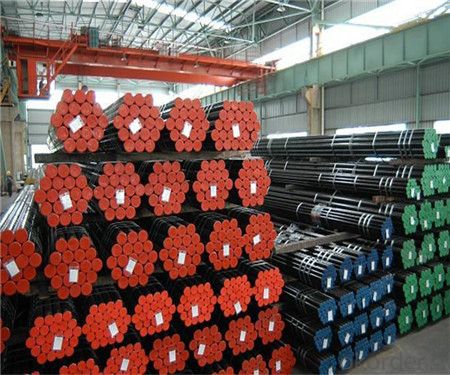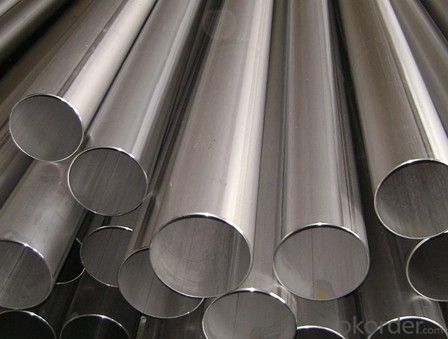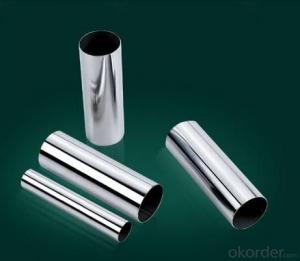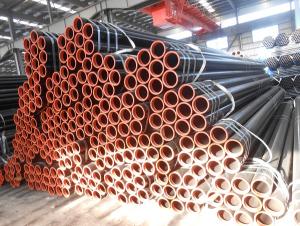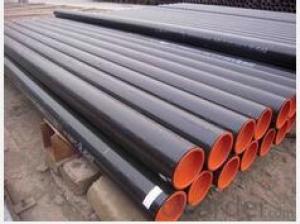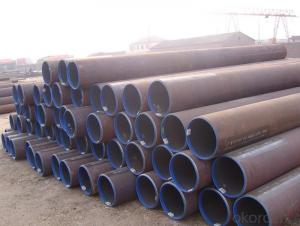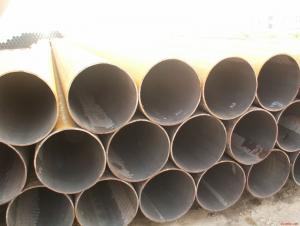Seamless Steel Pipe for Petroleum Cracking Multipurpose Hot
- Loading Port:
- China main port
- Payment Terms:
- TT or LC
- Min Order Qty:
- 10 m.t.
- Supply Capability:
- 4500 m.t./month
OKorder Service Pledge
OKorder Financial Service
You Might Also Like
Seamless steel pipe use
1 building category are: underground pipeline transportation, levy more groundwater extraction, hot water boiler used for transport etc..
2 mechanical processing, bearing sleeve, processing machinery parts etc..
Seamless steel pipe
3 electrical: gas supply, water power fluid pipeline.
4 wind power plants anti-static tube etc..
Product Description:
Standard:
GB9948 Chinese national standard
Application:
Served as for furnace tubes,heat exchange tubes and pipelines in petroleum and refinery plants
Model No.of major steel tubes:
1n 9n 1Er!rMn 1rhMn 1f:hM0 etC
Diamensional tolerances:
Types of steel tubes | Outer diameter | Wall thickness | ||
Cold-rolled tubes | Tube sizes(mm) | Tolerances(mm) | Tube sizes (mm) | Tolerances(mm) |
>30~50 | ±0.3 | ≤30 | ±10% | |
>50~219 | ±0.8% | |||
Hot-rolled tubes | >219 | ±1.0% | >20 | ±10% |
Mechanical properties:
Standard codes | Models of steel tubes | 抗拉强度(MPa) | 屈服强度(MPa) | 伸长率(%) | 冲击功(J) | 布氏硬度(HB) | 交货状态 |
GB9948 | 10 | 330~490 | ≥205 | ≥24 | / | / | 正火 |
20 | 410~550 | ≥245 | ≥21 | ≥39 | / | 正火 | |
15CrMo | 440~640 | ≥235 | ≥21 | ≥47 | ≤170 | 正火加回火 | |
1Cr2Mo | ≥390 | ≥175 | ≥22 | ≥92 | ≤179 | 正火加回火 | |
1Cr5Mo | ≥390 | ≥195 | ≥22 | ≥92 | ≤187 | 退火 |
Chemical composition:
Standard codes | Models of steel tubes | Chemical compositions(%) | |||||||
C | Si | Mn | P | S | Cr | Mo | Ni | ||
GB9948 | 10 | 0.07~0.14 | 0.17~0.37 | 0.35~0.65 | ≤0.035 | ≤0.035 | ≤0.15 | / | ≤0.25 |
20 | 0.17~0.24 | 0.17~0.37 | 0.35~0.65 | ≤0.035 | ≤0.035 | ≤0.25 | / | ≤0.25 | |
15CrMo | 0.12~0.18 | 0.17~0.37 | 0.40~0.70 | ≤0.035 | ≤0.035 | 0.80~1.10 | 0.40~0.55 | ≤0.30 | |
1Cr2Mo | ≤0.15 | 0.50~1.00 | 0.30~0.60 | ≤0.035 | ≤0.030 | 2.15~2.85 | 0.45~0.65 | / | |
1Cr5Mo | ≤0.15 | ≤0.50 | ≤0.60 | ≤0.035 | ≤0.030 | 4.00~6.00 | 0.45~0.60 | ≤0.60 | |
FAQ of Seamless Pipe :
①How is the quality of your products?
Our products are manufactured strictly according to national and internaional standard, and we take a test on every pipe before delivered out. If you want see our quality certifications and all kinds of testing report, please just ask us for it.
Guaranteed: If products’ quality don’t accord to discription as we give or the promise before you place order, we promise 100% refund.
②How about price?
Yes, we are factory and be able to give you lowest price below market one, and we have a policy that “ for saving time and absolutely honest business attitude, we quote as lowest as possible for any customer, and discount can be given according to quantity”,if you like bargain and factory price is not low enough as you think, just don’t waste your time.Please trust the quotation we would give you, it is professional one.
③Why should you chose us?
Chose happens because of quality, then price, We can give you both.Additionally, we can also offer professional products inquiry, products knowledge train(for agents), smooth goods delivery, exellent customer solution proposals.Our service formula: good quality+good price+good service=customer’s trust
SGS test is available, customer inspection before shipping is welcome, third party inspection is no problem.
Any question, pls feel free to contact us !
Seamless Pipe Images:
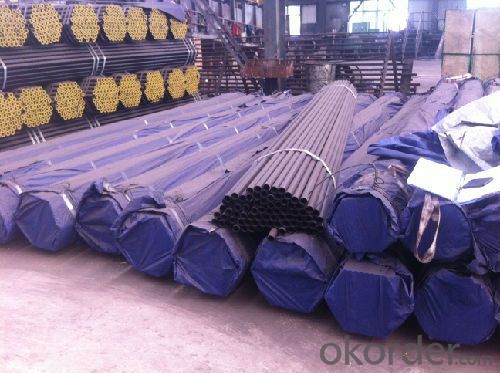
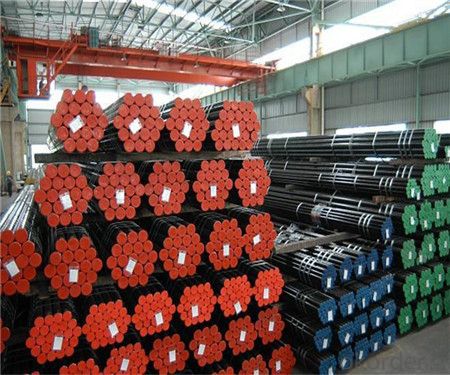
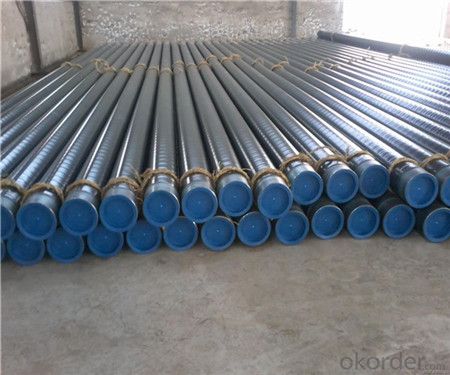
- Q: How are steel pipes threaded for connection?
- Steel pipes are threaded for connection using a threading machine or a die. The pipe is clamped securely into the machine, and a rotating die is then used to cut threads into the pipe's surface. This process creates the necessary grooves and ridges that allow the pipes to be securely connected together.
- Q: What does "steel pipe SC" mean?
- DN100 and "SCH80" refer to the outer diameter and the wall thickness of the steel pipe;
- Q: What is the difference between internal and external coating of steel pipes?
- The difference between internal and external coating of steel pipes lies in their purpose and application. Internal coating is applied to the inner surface of the pipe to protect it from corrosion, enhance flow efficiency, and prevent contamination of transported fluids. It is commonly used in industries such as oil and gas, water treatment, and chemical processing. On the other hand, external coating is applied to the outer surface of the pipe to protect it from corrosion caused by environmental factors such as moisture, chemicals, and physical damage. It is typically used in underground or above-ground applications, including pipelines, structural steel, and water distribution systems.
- Q: How are steel pipes used in the manufacturing of aerospace components?
- Steel pipes are used in the manufacturing of aerospace components as they provide structural support and durability. They are commonly used for fuel and hydraulic systems, allowing for the safe and efficient transfer of fluids throughout the aircraft. Additionally, steel pipes are utilized in the fabrication of engine components and airframe structures, ensuring strength and reliability in the demanding aerospace environment.
- Q: How are steel pipes inspected for defects?
- Steel pipes are inspected for defects using various methods, including visual inspection, ultrasonic testing, magnetic particle inspection, dye penetrant testing, and radiographic examination. These techniques help identify any cracks, corrosion, or other defects in the pipes to ensure their structural integrity and prevent any potential hazards or failures.
- Q: What is the thermal expansion coefficient of steel pipes?
- The thermal expansion coefficient of steel pipes varies based on the particular steel type and the temperature range in which the expansion is measured. On average, the thermal expansion coefficient of steel pipes is between 10-14 x 10^-6 per degree Celsius (10-14 μm/m°C). Thus, for each degree Celsius rise in temperature, the length of a steel pipe will roughly increase by 10-14 μm per meter. It is vital to acknowledge that this value is an average and may slightly differ based on the specific composition and treatment of the steel employed in the pipe.
- Q: Can steel pipes be used for signposts or street lighting poles?
- Yes, steel pipes can be used for signposts or street lighting poles. Steel is a strong and durable material that can withstand outdoor conditions and support the weight of signs or lighting fixtures. It is commonly used in construction for such purposes due to its strength and longevity.
- Q: Is the diameter of the steel tube indicated by the outer diameter by the wall thickness or by the inside diameter by the wall thickness?
- 1, DN refers to the nominal diameter of the pipe, the outer diameter and diameter of the average. The value of DN, the value of =De, the thickness of -0.5* tube wall. Note: This is neither outer diameter nor inner diameter. Water and gas transmission pipe (galvanized steel pipe or non galvanized steel pipe), cast iron pipe, steel plastic composite pipe and polyvinyl chloride (PVC) pipe, etc., shall be marked with nominal diameter "DN" (such as DN15, DN50).2, De mainly refers to the pipe diameter, PPR, PE, PP pipe diameter, generally use the De label, are marked as outer diameter and thickness of the form, De25 * 3.3 and D generally refer to the inner diameter of the pipe.4, d concrete pipe diameter. Reinforced concrete (or concrete) pipe, clay pipe, acid resistant ceramic tube, pipe and other pipe diameter gangwa, should be said with inner diameter of D (such as D230, D380 etc.)5, Phi represents the diameter of the ordinary circle. It can also indicate the outer diameter of the pipe, but it should be multiplied by the wall thickness at this time. Such as: Phi 25 x 3, indicating outer diameter 25mm, wall thickness of 3mm pipe.
- Q: How do steel pipes handle water hammer?
- Steel pipes can effectively handle water hammer by absorbing the pressure surges caused by sudden changes in water flow. The solid and durable nature of steel helps to dampen the impact and prevent damage to the pipes or other components of the plumbing system. Additionally, steel pipes can be designed and installed with appropriate supports, expansion joints, and water hammer arrestors to further mitigate the effects of water hammer.
- Q: Can steel pipes be used for the construction of dams?
- Yes, steel pipes can be used for the construction of dams. Steel pipes are often used in dam construction for various purposes such as water intake and outlet structures, penstocks, and spillway gates. They offer durability, strength, and resistance to corrosion, making them suitable for withstanding the high pressures and harsh environments associated with dam construction.
Send your message to us
Seamless Steel Pipe for Petroleum Cracking Multipurpose Hot
- Loading Port:
- China main port
- Payment Terms:
- TT or LC
- Min Order Qty:
- 10 m.t.
- Supply Capability:
- 4500 m.t./month
OKorder Service Pledge
OKorder Financial Service
Similar products
Hot products
Hot Searches
Related keywords
